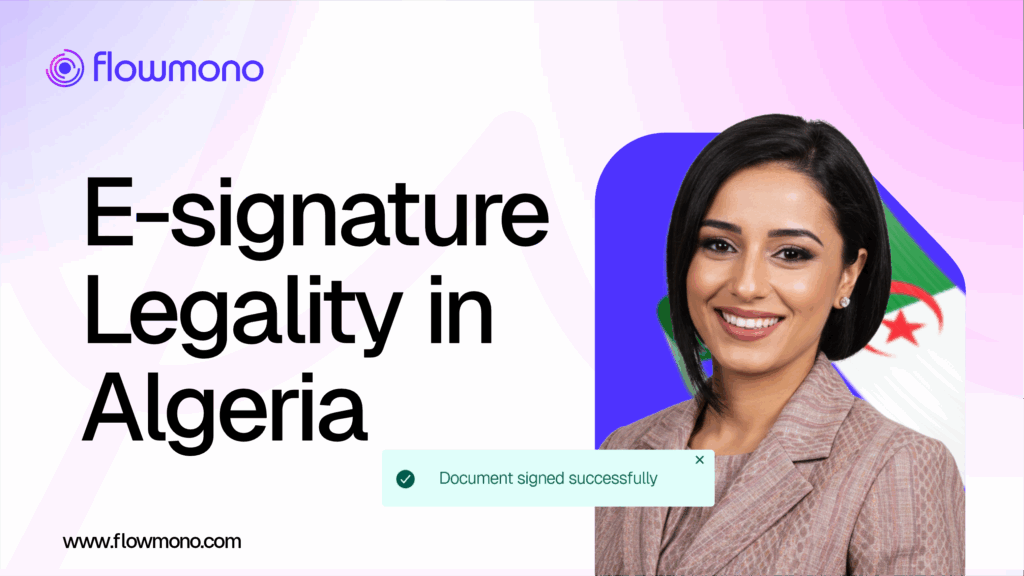
The digital transformation of the global economy has necessitated the legal recognition of electronic signatures. Algeria has embarked on this journey, establishing a legal framework to govern electronic transactions and certification. In Algeria, electronic signatures are governed by the Civil Code and Law No. 15-04 on Electronic Signatures.
This article provides a detailed overview of the legality of e-signatures in Algeria, exploring the legislative landscape, the types of documents that can and cannot be signed electronically, and the key developments that have shaped this area of law.
Key Provisions of the Law include:
- Legal Recognition: Electronic signatures are considered legally equivalent to handwritten signatures, provided they meet specific legal and technical criteria.
- Reliability and Security: An electronic signature must be created using a secure method that reliably verifies the identity of the signatory and ensures the integrity of the signed document.
- Qualified Electronic Signature: This refers to a digital signature generated using a digital certificate issued by a qualified certification service provider, offering the highest level of legal assurance.
What Is an Electronic Signature?
According to Algerian law, an electronic signature refers to a set of electronic data that is logically associated with other digital information and is used by an individual to express consent or authenticate a document. Once it meets all legal standards, this type of signature holds the same enforceability as a traditional handwritten signature.
Types of Electronic Signatures
Electronic signatures can take several forms, including but not limited to:
- Logging into an application or platform to grant permission.
- Signing with a stylus or finger on a touchscreen.
- Typing a name at the end of an email or digital form.
- Clicking “I Agree” after undergoing a verification process.
- Uploading a scanned image of a handwritten signature.
- Providing verbal consent through an audio command.
These varied forms underscore the flexibility of e-signatures, allowing users to select the most suitable method based on the context of the agreement and the level of security required.
Electronic signatures (e-signatures) have revolutionized how contracts and legal documents are executed worldwide. Algeria, like many countries, has adopted a legal framework that recognizes the enforceability of e-signatures, supporting digital transformation and e-governance. The legal validity of electronic signatures in Algeria is established by its national laws and aligned with international standards, facilitating trust in digital transactions.
The Legality and Adoption of Electronic Signatures in Algeria
The use of electronic signature technology has significantly transformed how contracts are executed in Algeria and across borders. This digital advancement has not only expedited business transactions but has also contributed to environmental sustainability by reducing the dependency on paper-based processes.
For electronic signatures to be effectively implemented within Algeria, certain critical elements must be in place. Foremost among these is the selection of an electronic signature service provider that fully complies with national regulations.
Under Law No. 15-04 of 11 Rabie Ethani 1436, electronic signatures are granted the same legal standing as handwritten ones, provided they fulfill the law’s established requirements. Nevertheless, some types of documents may still require wet-ink signatures due to specific legal obligations or regional practices. To ensure full compliance, businesses and individuals are advised to consult legal professionals familiar with local regulatory frameworks.
Ensuring Security and Compliance
Security remains a central concern in the adoption of e-signature technology. It is essential to choose a platform that prioritizes robust security protocols, such as data encryption, user authentication, and detailed audit trails, to safeguard against unauthorized access and to validate the authenticity of signed documents. Flowmono, for instance, adheres to rigorous security standards that align with global best practices, offering users peace of mind when handling sensitive transactions.
Documents That Can Be Signed Electronically
In Algeria, most documents can be signed electronically, including:
- Commercial contracts
- Employment agreements
- Service level agreements (SLAs)
- Non-disclosure agreements (NDAs)
- Procurement documents
- Government e-services (where available)
Documents That Cannot Be Signed Electronically
Despite broad acceptance, certain documents are excluded from electronic execution in Algeria, especially those requiring physical formality or notarization:
- Wills and inheritance documents
- Real estate transfers or deeds
- Marriage contracts
- Notarized acts
- Court documents (unless expressly permitted by judicial regulations)
These exclusions are consistent with many jurisdictions where public documents require formal witnessing or are subject to strict authenticity requirements.
Notable Changes and Recent Developments
a. Push for Digital Transformation:
The Algerian government has undertaken several digital transformation initiatives to promote e-governance and e-commerce. These include:
- National strategies for e-banking and digital signatures in public procurement
- The establishment of local Certification Authorities (CAs)
b. Updated Infrastructure:
- The Ministry of Post, Telecommunications, Technologies, and Digitalization has pushed for increasing the adoption of e-signatures in government processes.
c. Future Enhancements:
- Planned updates to align Algerian laws more closely with the UNCITRAL Model Laws on e-commerce and electronic signatures.
Disclaimer
The information on this site is for general information purposes only and is not intended to serve as legal advice. Laws governing the subject matter may change quickly, so Flowmono cannot guarantee that all the information on this site is current or correct. Should you have specific legal questions about any of the information on this site, you should consult with a legal practitioner in your area.
References
- Law No. 15-04 of 1 February 2015 – Electronic Signature Law, Algeria
- Algerian Ministry of Post and Telecommunications – www.mpttn.gov.dz
- UNCITRAL Model Law on Electronic Signatures, 2001
![]()